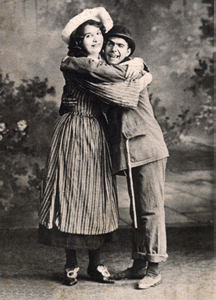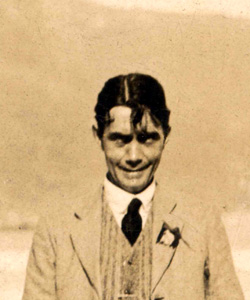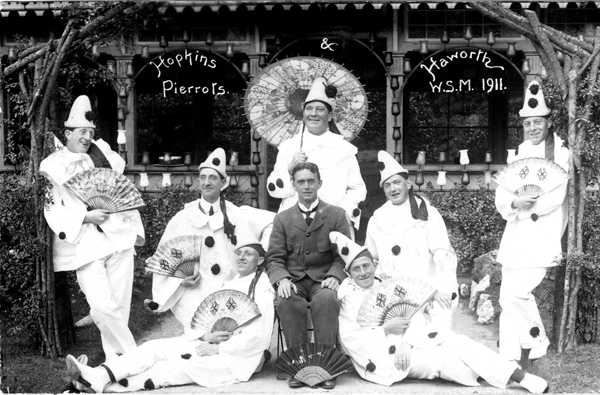
Edward Lewis Hopkins, “Ted”, was born at Melincryddan, Neath, South Wales in 1875. A talented amateur performer, he soon found himself working professionally in the Welsh valleys with his sister May and brothers Dick and Will (Messrs. Hopkins Bros. Co). In 1905 he was spotted by William Lea, Oswald Stoll’s right hand man in Cardiff, and was offered a week’s trial with his sister on the Stoll Moss circuit. The quips and eccentricities of the couple, especially in their “Welsh Courtship” sketch secured them a further thirteen months of work with Stoll Moss and the start of over twenty years of Music Hall success. In 1912 the couple toured to South Africa, where Ted contracted enteric fever, after which he would never tour abroad again.
In addition to his comedy pairing with his sister, Ted was well known for his solo acts Treorchy Fair, The Urban District Council, The Squire and his sporting comedies The Harrier and The Prize Fighter. Ted was also a prolific theatrical manager, producing summer concert parties and pantomimes. Hopkins & Haworth’s Merry Cadets and Pierrots were regular features at Weston Super Mare in the pre-WW1 years. Ted also published a book of “sad and gay” original stories and poems.
As early as 1907 Ted (and May) joined the ranks of Harry Lauder and Albert Whelan by recording their work to cylinder. Between then and 1934 the couple produced numerous recordings of their work for public sale.
In 1913 he became involved in the very first attempt at an indigenous National Theatre for Wales. He gave up his lucrative touring to take the creative reins of the company, appearing with the very first company of Welsh actors to play on the London stage. Other members of that theatre movement were Ted’s siblings May, Dick and Will, Gareth Hughes (the first Welsh film star), Eleanor Daniels (who worked on Broadway from 1914 to the 1930’s) and Welsh comedian Tom Owen. Ted was also heavily involved in the setting up of the Welsh Drama League in the late 1920’s. An involvement which cost him a great deal of investment.
In 1915 Ted married Violet Brodrick and they made their home in Cowbridge Road, Cardiff. Violet worked alongside Ted and the couple made an effective partnership both on and off stage. Regular visitors to the house included John Galsworthy, John Drinkwater, Ivor Novello, Will Hay and the Marquis of Bute. In 1919 Lloyd George offered Ted a knighthood for his services to Welsh Drama but, after careful thought, Ted declined on the grounds that it would be detrimental to his image of the downtrodden Welshman.
Ted suffered severe losses in the Stock Exchange crash and, with work becoming scarce in the early 1930’s due to the advent of talking pictures and a slump in Variety, he moved back to London with his eye on the film industry. He had barely settled in London when he became suddenly ill and died.


